GALLUP NEWS SERVICE
PRINCETON, NJ --
1. Do Americans favor the idea of military intervention in Iraq?
Basic support for the use of American ground troops to remove Saddam Hussein from power has remained steady throughout the month of September. The Sept. 20-22 CNN/USA Today/Gallup Poll found that 57% of Americans said they favored such action, while 38% opposed it.
| Public Support for Invading Iraq 2001-2002 |
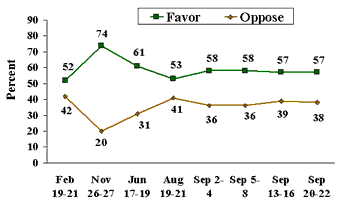 |
There are similar (and sometimes higher) levels of support as measured by other polls, ranging from 58% support in a Sept. 24-25 Fox News poll to 68% in a Sept. 22-23 CBS News poll. Most of the basic questions that have been asked about Iraq are phrased in a similar fashion, emphasizing U.S. military action, and specifically mentioning the regime changing action of removing Saddam Hussein from power.
These levels of support do not arise out of an attitudinal vacuum. There is little question that the American public has pre-existing, strongly negative perceptions of Iraq and its leader. Saddam Hussein received the worst rating of any public figure tested in Gallup Poll history -- 1% positive and 96% negative in a December 1998 Gallup Poll. Earlier this year, the country of Iraq itself received a 6% favorable and 88% unfavorable rating. That's the worst of any of the 25 countries tested in that poll. Asked in February 2001 what country was America's worst enemy, Americans named Iraq significantly more often than any other country.
Most Americans feel that Iraq has developed or is developing weapons of mass destruction. Many Americans feel that if left alone, Iraq will use those weapons against the United States within five years. Most Americans feel that Saddam Hussein sponsors terrorism that affects the United States. A little more than half of Americans say Saddam Hussein was personally and directly involved in the Sept. 11 terrorist attacks.
There are, however, conditions and nuances to the public's support for an invasion of Iraq. Americans are by no means giving the administration a blank check. In particular, Americans appear to want the administration to cover its bases, and to seek counsel from Congress and U.S. allies before proceeding. (See Sections 7 and 8 below for more details.)
2. How different is this from 1990?
The American public was generally cautious in its support for going to war against Iraq in the months before the Persian Gulf War began in January 2001. The actual levels of support varied depending on how questions were phrased. For example, Americans were asked in November 1990, "If the current situation in the Middle East involving Iraq and Kuwait does not change by January, would you favor or oppose the United States going to war with Iraq in order to drive the Iraqis out of Kuwait?" Only 37% said yes in response to this question, while 51% said no.
After the conclusion of the war in early March 1991, support for going back after Saddam Hussein was above the majority level and has stayed that way since. Between 52% and 74% of Americans have favored such action across a number of measures taken over the last decade. Interestingly, in April 1992, 55% of Americans favored such action, while 40% opposed it -- essentially the same level of support measured today.
There is also nothing particularly new about the idea of the president seeking congressional support before going to war. A majority of Americans wanted then-President Bush to obtain congressional approval for war in the build-up to the Persian Gulf conflict in 1990, which he got. The public wanted allies involved in the decision to go to war against Iraq in 1990, as well.
3. Which groups of Americans are most supportive of taking military action to topple Hussein's regime?
A Sept. 20-22 CNN/USA Today/Gallup Poll finds that men and women are now essentially even in their support for sending U.S. troops to Iraq in an attempt to remove Hussein from power. The results show that 59% of men and 56% of women support military action against Iraq, while 37% of men and 39% of women oppose it.
Previous Gallup polling has generally found women to be much less supportive of war than are men, so the current lack of a gender gap is significant in comparison.
An Apr. 4-6, 1991 Gallup Poll, conducted after the end of the Persian Gulf War, found a 17 percentage point difference between men and women (65% of men versus 48% of women) when asked if the United States and its allies should have continued fighting until Hussein was removed from power. During the situation with Kosovo in February 1999, there was an 11 percentage point difference between men and women in their support of U.S. military action against the Yugoslavian Serbs. Nearly half of all men, 47%, supported military action, but fewer than four in 10 women, 38%, supported it.
The latest polling also underscores the very partisan nature of support for ousting Hussein. Republicans show much more support for military action than do Democrats. More than eight in 10 Republicans favor sending U.S. troops to Iraq in an effort to topple Hussein's regime, while fewer than one in six oppose such action. A slight majority of independents, 54%, support military action against Iraq, while more than four in 10 oppose it. Only about four in 10 Democrats support military action against Iraq, and a slight majority of Democrats, 53%, oppose the use of military force against Iraq.
This pattern of partisan differences reflects, at least in part, the significant degree to which the possibility of war with Iraq has been identified as a Bush administration initiative.
Current polling also shows that older Americans are much less likely than younger Americans to favor sending U.S. troops to Iraq. Fewer than half (48%) of all adults over the age of 50 support military action against Iraq, compared with two-thirds of adults in the 30-49 age group and six in 10 adults aged 18-24 who support it.
4. How sensitive are Americans to the possible negative consequences of war with Iraq?
One of the chief arguments made by critics of Bush's Iraq policy focuses on the contention that the mission would spread the United States military too thin, and weaken the country's ability to fight the war on terrorism. However, according to a recent Gallup Poll, only 29% of Americans believe that a U.S. invasion of Iraq would render the United States ineffective in the war on terrorism in other countries. Nearly as many, 23%, believe it would have no impact on U.S. ability to pursue the war on terrorism, while 42% believe the military's ability elsewhere would be reduced, but remain effective overall.
Americans are more wary when it comes to other possible negative outcomes of invading Iraq, however. A Time/CNN poll conducted in August found a large majority of Americans (88%) believing that an increase in oil prices would be likely as a result. Also, 77% predicted more acts of terrorism in the United States, and 74% believe it would destabilize the Middle East. Somewhat lower numbers, although still a majority, believe that invading Iraq will reduce cooperation from U.S. allies in fighting terrorism, and 55% believe it will spark an economic recession in the United States.
|
Time/CNN/Harris Interactive Aug. 28-29, 2002
Please tell me whether you think each of the
following is likely or unlikely to occur |
|||
|
Likely |
Not likely |
Not sure |
|
|
% |
% |
% |
|
|
An increase in oil prices |
88 |
11 |
1 |
|
More acts of terrorism in the United States |
77 |
19 |
4 |
|
Greater instability in the Middle East |
74 |
21 |
5 |
|
Weapons of mass destruction will be used against U.S. troops |
66 |
29 |
5 |
|
Less cooperation from our allies in fighting terrorism |
58 |
36 |
6 |
|
Weapons of mass destruction will be used against Israel |
58 |
32 |
10 |
|
An economic recession in the U.S. |
55 |
39 |
6 |
A Los Angeles Times poll from August also found a solid majority of Americans (66%) believing that launching an attack on Iraq will subject the United States to further acts of terrorism. But, compared with results obtained by Time/CNN, this survey found somewhat lower concern (40%) that the attack would destabilize the situation in the Middle East. About as many believed that attacking Iraq could either contribute to stabilizing that region (23%) or have no effect (20%).
Still, it should be noted that while Americans are aware of these possible outcomes, they nevertheless support attacking Iraq to remove Saddam Hussein from power, thus indicating they are willing to accept the risks.
5. The current intense focus on the possibility of military action in Iraq has clearly been identified as a Bush administration push. How are he and other members of his administration faring?
Bush's job approval ratings, which had been in a gradually declining slope since the record peaks of last fall, have stabilized since Iraq became front page news. Bush's latest approval rating is 68%, down considerably from last fall and winter, but high by historical standards. More specifically, 64% of Americans approve of the way Bush is handling the situation in Iraq.
Despite these high approval ratings, and the majority support for the idea of military action in Iraq, the public is divided in its view of whether the Bush administration has a clear and well-thought out policy on Iraq, with 46% saying it does and 48% saying it does not. Similarly, half of Americans believe the administration has done enough to explain to the public why it might take military action against Iraq, while 47% believe it has not. This represents an improvement from early September, at which time 39% thought the administration had made its case and 58% did not.
Most Americans hold overall favorable views of the key Bush personnel in the Iraq situation, including Vice President Dick Cheney (65% favorable, 24% unfavorable), Secretary of Defense Donald Rumsfeld (61% favorable, 19% unfavorable), and Secretary of State Colin Powell (88% favorable, 6% unfavorable). Powell has consistently been one of the most positively rated public figures in Gallup Poll history.
6. Do Americans think that a possible war with Iraq will be long and difficult?
Americans are somewhat divided over how long a war with Iraq might last, and their views are highly related to their political orientation. According to a CNN/USA Today/Gallup Poll conducted Sept. 20-22, 54% of Americans say the war is likely to be long, while 42% expect it to be short. These views are similar to those expressed shortly after the Japanese attack on Pearl Harbor, in December 1941. At that time, 51% of Americans expected the war against Japan to be a long one, while 41% said it would be short.
Do you think a war against Iraq would be a long war, or a short one?
BASED ON --492-- NATIONAL ADULTS IN FORM A
|
|
Long war |
Short war |
No opinion |
|
|
War against Iraq |
||||
|
2002 Sep 20-22 |
54% |
42 |
4 |
|
|
War on Terrorism |
||||
|
2001 Nov 26-27 ^ |
87% |
11 |
2 |
|
|
2001 Sep 21-22 ^ |
92% |
6 |
2 |
|
|
World War II Trend |
||||
|
1941 Dec 12-17 † |
51% |
36 |
13 |
|
|
^ |
WORDING: Do you think the war against terrorism will be a long war, or a short one? |
|||
|
† |
WORDING: Do you think the war against Japan will be a long war, or a short one? |
|||
However, Americans are much more optimistic about the war against Iraq than they have been about the war on terrorism. In two readings after the 9/11 terrorist attacks, taken in September and November 2001, about nine in 10 Americans said the war on terrorism would be a long one.
Women are much more likely than men to think the war against Iraq could be a long one. Less than a majority of men (44%) express that view, compared with close to two-thirds of women (65%), a 21 percentage point gender gap.
| Would War Against Iraq Be Long or Short? Compared by Gender |
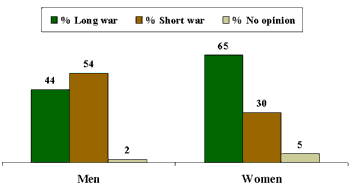 |
| Sep 20-22, 2002 |
There are also major differences between Democrats, and Republicans and independents. While the latter two groups are about evenly divided over the question, showing just two- and three-point margins in favor of a long war, Democrats predict a long over a short war by a margin of 28 percentage points, 63% to 35%.
| Would War Against Iraq Be Long or Short? Compared by Party |
 |
| Sep 20-22, 2002 |
While Americans are divided on whether a war with Iraq may be long or short, they show a much greater consensus that the war is likely to be difficult. By more than a two-to-one margin, 68% to 29%, Americans say such a war would be "a difficult one" rather than "a comparatively easy one." As with the length of the war, attitudes on how difficult the war might be are similar to the attitudes measured about World War II, but not as pessimistic as those measured about the war on terrorism.
Do you think a war against Iraq would be a difficult one, or a comparatively easy one?
BASED ON --518-- NATIONAL ADULTS IN FORM B
|
|
|
Comparatively |
No |
|
|
War against Iraq |
||||
|
2002 Sep 20-22 |
68% |
29 |
3 |
|
|
War on Terrorism |
||||
|
2001 Nov 26-27 ^ |
95% |
4 |
1 |
|
|
2001 Sep 21-22 ^ |
94% |
5 |
1 |
|
|
World War II Trend |
||||
|
1941 Dec 12-17 † |
65% |
26 |
9 |
|
|
^ |
WORDING: Do you think the war against terrorism will be a difficult one, or a comparatively easy one? |
|||
|
† |
WORDING: Do you think the war against Japan will be a difficult one for us, or a comparatively easy one? |
|||
Again, there are major gender differences on these attitudes. While majorities of both men and women agree the war would be difficult, men express that view by a 56% to 43% margin, while women take that position by a much larger margin of 78% to 18%. This 22-point gender gap is similar to the gender gap regarding the length of the war.
| Do you think a war against Iraq would be a
difficult one, or a comparatively easy one? Compared by Gender |
 |
| Sep 20-22, 2002 |
There are also major differences by age. Older people are more likely to say the war will be a difficult one than are younger people.
| Do you think a war against Iraq would be a
difficult one, or a comparatively easy one? Compared by Age |
 |
| Sep 20-22, 2002 |
Finally, like the attitudes on the war's probable length, attitudes on the war's likely difficulty are highly related to party affiliation. Large majorities of Republicans, independents, and Democrats say the war will be difficult, but Democrats are more likely to express that view than are the other two groups.
| Do you think a war against Iraq would be a
difficult one, or a comparatively easy one? Compared by Party |
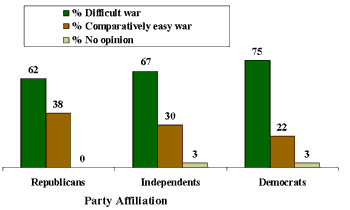 |
| Sep 20-22, 2002 |
7. Congress is debating Bush's Iraq resolution. Any feel for what Americans want Congress to do on this?
Congress is debating the substance and particulars of a resolution that would give President Bush the authority to take military action against Iraq. The draft resolution Bush sent lawmakers two weeks ago says, "The president is authorized to use all means that he determines to be appropriate, including force" against Iraq and to "restore international peace and security in the region." Among the sticking points for some members of Congress are whether the president's authority should be limited to Iraq rather than "the region," whether a time limit should be put on the authorization to use force, and whether congressional approval should be contingent on support from the United Nations.
It is clear that Americans want President Bush to get congressional authorization before proceeding with an attack on that country. According to a recent Gallup Poll, 69% of the public says that congressional authorization is a must, similar to the findings of a recent CBS News poll putting this at 65%. Moreover, the available polling suggests that Americans are amenable to all of the aforementioned restrictions on Bush's authority.
A mid-September Gallup Poll, however, found a slim majority opposed to giving Bush the broad latitude he was originally looking for (Bush has since revised the wording that he is asking be included in the Congressional resolution). According to the Sept. 20-22 survey, only 47% of Americans said Congress should vote to give Bush "unlimited authority to use military action against Iraq whenever he feels it is necessary." Fifty-one percent said they should not give Bush this authority.
| Do you think Congress should -- or should not -- vote to give President Bush unlimited authority to use military action against Iraq whenever he feels it is necessary? |
 |
| Sep 13-16, 2002 |
Members of Congress who are reluctant to voice opposition to the president on the subject of Iraq might consider the results of a recent CBS News polling question about Congress' scrutiny of Bush's Iraq policy thus far. CBS found that barely one in five Americans (22%) believe Congress is asking too many questions; twice as many (44%) believe it is not asking enough.
| Overall, is Congress asking too many questions about President Bush's policy toward Iraq, or isn't Congress asking enough questions? |
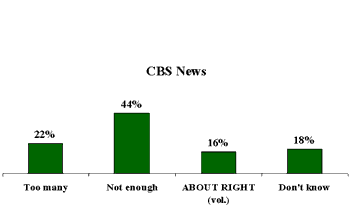 |
| Sep 13-16, 2002 |
8. Bush has been pushing for United Nations support for his vision of what needs to be done in regards to Iraq. Does the public want U.N. involvement? What exactly does the public want the U.N. to do?
Americans are consistent about the need for U.N. support as a prerequisite for an American attack on Iraq. Across a variety of poll questions on this topic, it appears that only about one-third of Americans would favor U.S. military action against Iraq in the face of U.N. opposition. Similarly, Americans are also keen to secure the participation of U.S. allies in any future military attack on Iraq. Nearly four in five Americans (79%) told Gallup in mid-September that they would favor an attack on Iraq if other countries participate in the invasion. This drops to 38%, with 59% opposed, in the event that the United States has to go it alone.
All of this mirrors the situation the first President Bush faced in 1991, when he was contemplating war with Iraq, and he did in fact obtain U.N. support before launching an attack.
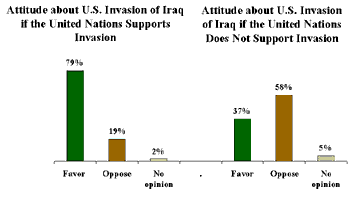 |
| Sep 20-22, 2002 |
The above results are virtually identical to those found in a Sept. 13-16 CNN/USA Toda/Gallup Poll, which asked a differently worded question. The results show that just 37% of Americans indicate they would support an invasion of Iraq without U.N. support. However, another 46% would support such an invasion if the U.N. gave its endorsement, making the total in support just over eight in 10 (83%).
| Which comes closest to your point of view about sending U.S. ground troops to Iraq? |
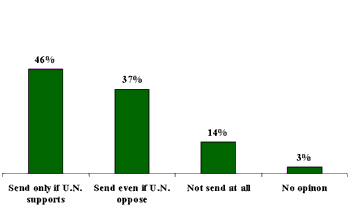 |
| Sep 13-16, 2002 |
The same poll shows that most Americans feel the United Nations has been too lenient in its treatment of Iraq, and that the organization should now take more aggressive steps to conduct weapons inspections in that country. Specifically, 80% of Americans say the United Nations has not been "tough enough" in its dealing with Iraq, while just 15% say it has, and only 2% say the organization has been too tough.
| Do you think the United Nations -- has been too tough, has been about right, or has not been tough enough-- in dealing with Iraq? |
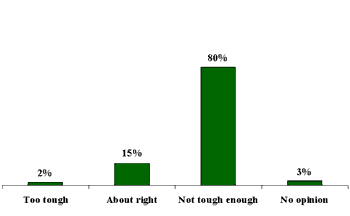 |
| Sep 13-16, 2002 |
More than nine in 10 Americans (93%) want the United Nations to pass a resolution that would impose a deadline on Iraq to submit to weapons inspection or face "grave consequences." If the United Nations passes such a resolution, and Iraq fails to meet the deadline, 61% of Americans say the United Nations should then take military action against Iraq, while 35% say more diplomatic efforts should be made.
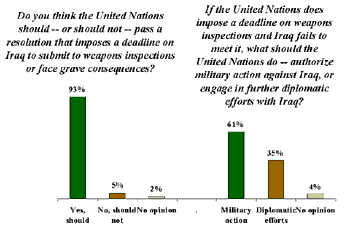 |
| Sep 13-16, 2002 |
9. How is this war likely to affect the coming Nov. 5 elections -- if at all?
Will the Iraq issue have a big influence on the forthcoming elections? The potential is there, but its likely impact is not yet evident. Nearly eight in 10 Americans say the possibility of war with Iraq is an issue that will be very important to their vote for Congress this year, making it one of the highest rated issues tested -- along with terrorism, economic conditions, and the situation in the Middle East. When asked which would have the greatest influence on their votes, 49% of Americans say it will be the possibility of war with Iraq, and 42% say the economy. This represents a shift from earlier in the campaign, when a majority of the public said the economy would be more influential and just over a third said Iraq.
Republicans have a decided perceptual advantage over the Democrats on the Iraq issue -- 52% say the Republicans in Congress would do a better job handling the issue and 33% say the Democrats, making it one of the strongest Republican issues of those tested. Registered voters who say Iraq is a more important issue to their vote are more likely to say they will vote for the Republican congressional candidate in their district, rather than the Democratic candidate (50% to 45%). But the margin is much smaller than the Republican advantage on the issue might suggest. By comparison, the Democratic Party enjoys a 55% to 33% advantage on the generic ballot among registered voters who say the economy is a more important issue.
Overall, Democrats continue to lead in the generic congressional ballot, 50% to 46% among likely voters, despite the stated importance of the Iraq issue and the considerable Republican advantage on it.
